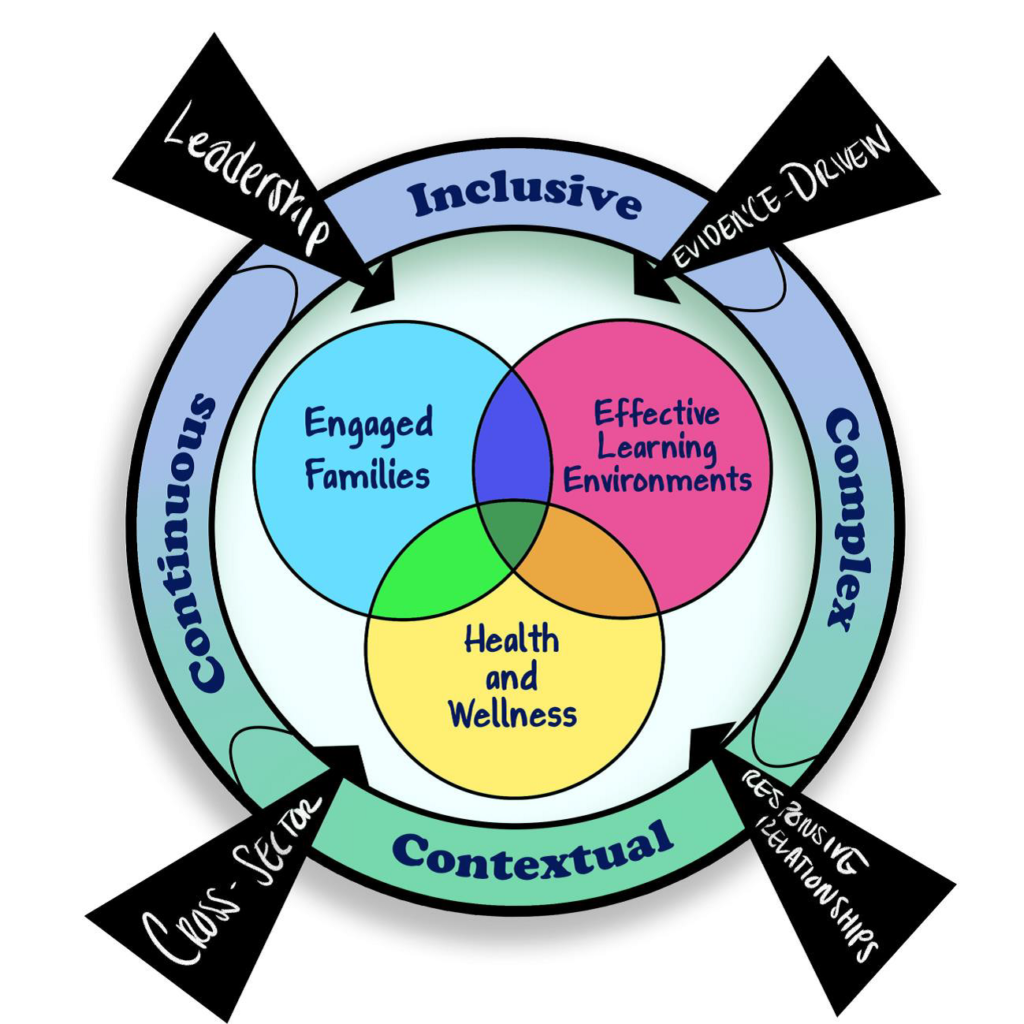 Created in 2007 by the Pennsylvania Office of Child Development and Early Learning (OCDEL), The Pennsylvania Key implements the work and supports the policies developed and managed by OCDEL. Learn More. >
Created in 2007 by the Pennsylvania Office of Child Development and Early Learning (OCDEL), The Pennsylvania Key implements the work and supports the policies developed and managed by OCDEL. Learn More. >A P3 approach is a mindset that focuses on building a comprehensive system of policies and practices that vertically and horizontally align to support unique needs of all children across the early learning continuum (prenatally through third grade). To support a P3 approach, The Pennsylvania Prenatal through Third Grade (P3) Systems Building Logic Model was developed to assist a variety of groups (state agencies, regional teams, local communities) in the planning and implementation of innovative P3 policies and practices.

The model includes four guiding principle that remind us that systems building work is complex, continuous, and contextual, and should focus on inclusive policies and practices. The model includes three areas of focus (Effective Learning Environments, Family Engagement, and Physical and Mental Health and Well-Being) that impact one another. The final components of the model are called the “accelerants.” Accelerants deal with how implementation in the areas of impact are accomplished and include responsive relationships, cross sector coordination, leadership, data-informed decision making.
The P3 Systems Building Model coupled with Pennsylvania’s established ECE infrastructure, creates transformative opportunities for the development of policies, strategies, and programs that ensure wide and diverse participation of children, families, and providers in high-quality ECE services and fully support children’s transition to kindergarten and the early grades statewide.
OCDEL has an informative, asynchronous course that provides a deeper review of P3. To view the course P3 Systems Thinking, visit the PD Registry.
These P3 courses offer an opportunity to bring together early education and school-age K-3 leaders in a cooperative, professional learning community. This partnership encourages an understanding of the early education and school-based educational systems, which children and families navigate. It also helps to build relationships among these leaders to create coordinated, aligned, and coherent learning experiences for students and their families.
Early education program directors and school-age administrators are in a unique position in their communities. These individuals have the opportunity to acquire deeper knowledge and greater leadership skills to successfully identify and navigate the challenges and opportunities in creating P3 alignment. These P3 courses are ideal for those leaders who want to take a deeper dive into collaborative learning and relationship building around early learning and P3 alignment. PQAS and Act 45 hours are offered.
The Planning, Implementing, and Evaluating Programs: Prenatal through Grade 3 Pennsylvania Inspired Leaders (PIL) course focuses on how an aligned prenatal to grade3 (P3) system can improve child outcomes and prevent or close achievement gaps. This course is designed to increase the capacity of early education and school-age leaders to understand, connect, and align the many public and private systems that are focused on the growth, development, and education of children prenatally through grade 3. This course will focus on what P3 leaders need to know and be able to do to improve the quality and coherence of children’s learning opportunities.
Using Pennsylvania’s P3 Systems Building Logic Model P3 framework, participants will explore strategies and methods for evaluating implementation efforts, as well as concrete examples of how to enrich and expand prenatal through grade 3 approaches.
Developmental science has long recognized the years from birth through age 8 as a crucial period during which children’s educational paths are shaped. Development during the preschool through third-grade years influences children’s later educational achievements and lifelong success. Comprehensive and effective P-3 approaches ensure that children’s early education experiences are high quality, appropriately dosed, and well-coordinated. This involves providing intentional, developmentally appropriate instruction that balances cognitive, social, and emotional growth in early childhood and elementary settings. It also requires ensuring that children have sufficient time each year for child-friendly and instructionally rich experiences. Additionally, P3 emphasizes the importance of increased alignment across the entire continuum of learning environments—including fostering collaboration among teachers and data sharing across grade levels; aligning standards and assessments with age groups; coordinating assessments with instruction; strengthening partnerships between families and schools; promoting collaboration between schools and early learning or preschool programs; and ensuring smooth transitions as children move through the system.
For more information and to register for either course, see the website for the Pennsylvania Inspired Leadership Program (PIL).